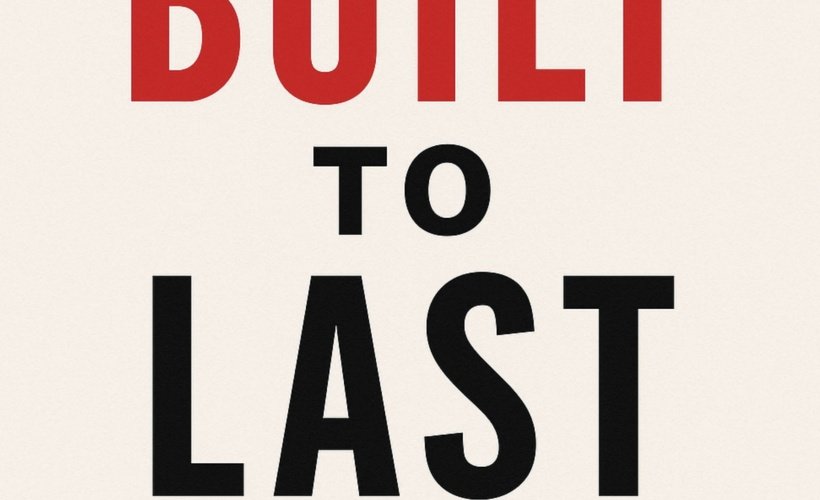
CORE ATTRIBUTES THAT BUILD LONG-STANDING BUSINESS VENTURES
Celebrating 16 years of Business Goa by spotlighting the core practices that shape enduring, value-driven enterprises, and the entrepreneurs and business leaders who live them
In a dynamic and ever-evolving business landscape, longevity is not a matter of chance it is the result of deliberate choices, disciplined action, and values-driven leadership. As Business Goa celebrates its 16th anniversary, we shine a spotlight on the pillars that support enduring success and resilient enterprises. Across sectors and scales, successful businesses share common fundamentals time-tested principles that transcend market fluctuations, technological disruption, and leadership transitions.
In this special cover story, we delve into eight essential business practices that define sustainable and thriving enterprises. From visionary entrepreneurs to operational masters, we feature business leaders and experts who have embedded these core principles into their organizations offering both inspiration and insight to the business community of Goa and beyond.
Putting the customer at the heart of the business isn’t just good service it is smart strategy. Sustainable companies continuously evolve by deeply understanding their customers’ needs, preferences, and pain points. From personalized experiences to responsive support, a customer-first mindset fuels loyalty, innovation, and long-term growth. These businesses view each interaction as a chance to build trust and value, making customers’ not just consumers, but advocates.
Behind every enduring enterprise is a foundation of robust financial management. Prudent cash flow planning, strategic investment, risk assessment, and cost control form the backbone of stability and growth. Leaders who prioritize financial health can weather uncertainty and seize opportunity with confidence. Financial discipline ensures that ambition is grounded in sustainability, not speculation.
Enduring success is never accidental it is a result of clear vision backed by deliberate planning. While reacting to short-term challenges is essential, visionary leaders also plan for the future, balancing ambition with realism. Strategic foresight helps businesses set bold goals, anticipate change, and build legacies that outlast trends.
The most enduring companies are those that recognize their role in the broader ecosystem. Sustainability is no longer optional it’s imperative. From reducing environmental impact to giving back to the community, socially responsible businesses align profit with purpose. These enterprises measure success not just in financial returns, but in the positive impact they create.
As we mark 16 years of Business Goa, this special edition is more than a celebration of milestones it is a tribute to the resilience, foresight, and character that define enduring enterprises. The entrepreneurs and business leaders featured in this issue exemplify what it means to build with intention, to lead with values, and to grow with purpose.
What stands out most is how these leaders have not merely adopted these values, they have embedded them into the very DNA of their businesses. Their journeys offer more than insight; they offer inspiration to Gen-Next of Goan enterprise, seeking to create not just profitable ventures, but meaningful legacies.
Cesar has prioritized values such as integrity, honesty, and transparency, embedding them into Wallace’s corporate culture. His focus on high manufacturing standards and mutual respect within the organization has promoted both ethical governance and business growth. He also played a key role in shaping industry regulations while leading the Goa Pharmaceutical Manufacturers’ Association (GPMA).
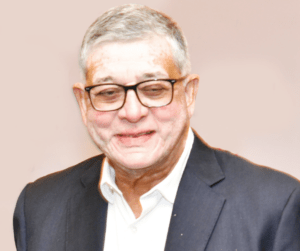
Committed to innovation with responsibility, Cesar spearheaded the creation of the Wallace Innovation Centre – a state-of-the-art R&D facility inaugurated in December 2020. The Centre played a key role in developing patient-centric drug delivery systems that meet global quality standards while promoting affordability and ethical practices. Cesar fostered participative and merit-based leadership at Wallace, blending family legacy with professional management to encourage the next generation of leaders.
Beyond business, Cesar has dedicated to community welfare. He was honoured with the Lifetime Achievement Award in 2019 by the Yachting Association of India for his contributions to youth sports and sailing in Goa. Alongside his wife, Dr. Maria Emilia “Mimi” Menezes, he has been a pillar of support to healthcare initiatives through the Prateek Menezes Memorial Foundation and the CMM Polyclinic, both of which serve underprivileged cancer patients and families on a no-profit basis.
Cesar Menezes exemplifies how a family-run business can evolve into a professionally managed, ethically guided organization committed to both commercial excellence and societal good.
• Values-led leadership rooted in integrity
• Meritocratic governance and inclusive leadership
• Innovation with social accountability
• Strong philanthropic and community focus
At the core of Dempo’s leadership is a people-first approach. He promotes human-centric governance, emphasizing respect, fairness, and meritocracy within the organization. Initiatives such as the Chairman’s Club recognize employee excellence and foster a culture of inclusion and innovation. His leadership ensures that all voices in the organization are valued.
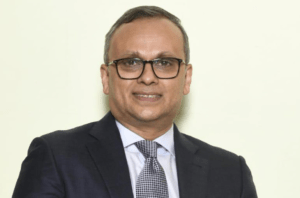
Beyond corporate walls, Dempo actively advocates for ethical governance on national platforms. As past President of the All India Management Association (AIMA) and the Goa Chamber of Commerce and Industry (GCCI), he has consistently called for transparency, accountability, and values-driven capitalism in Indian business. His efforts reflect a commitment to elevating ethical standards across industries. Corporate social responsibility is a cornerstone of Dempo’s business model. The group has suported education, health, sports, culture, and environmental initiatives, much before CSR became a legal mandate.
Institutions such as the Dempo Charities Trust and the Vasantrao Dempo Education & Research Foundation embody this commitment. He also supports ethical innovation, as seen in the adoption of AI-based interviews at S.S. Dempo College to ensure fairness in admissions.
Recognized with honours like the Asia Pacific Entrepreneurship Award and a seat on Carnegie Mellon University’s Board of Trustees, Dempo’s legacy is defined not by accolades but by values. His career stands as proof that long-term business success is best built on a foundation of trust, ethical practices, and a clear vision for the common good.
• Promotes respect, fairness, and empowerment for employees and stakeholders
• Invests significantly in education, health, environment, sports, and culture – beyond statutory CSR mandates
• Leads by example
His journey is defined by integrity, trust, and respect for all stakeholders.
At just 20, Atul began assembling diesel generators in a small garage. By 1996, PEIPL relocated to Tuem Industrial Estate and expanded into every vertical important for making gensets. His early focus on quality, lean operations, and fairness laid the foundation for sustainable, ethical growth.
Under Atul’s leadership, PEIPL developed a strong values-driven culture. Every customer interaction emphasized fairness and transparency. The company holds ISO 9001, 14001, and 45001 certifications, reflecting its commitment to operational excellence and ethical practices.
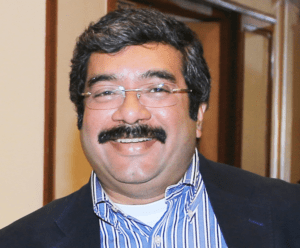
Atul expanded the Group into 60+ countries, notably acquiring UK-based Sheaf Power Ltd. in 2018. The acquisition retained the company’s identity and employees, reflecting his principle of equitable treatment and trust in international partnerships.
PEIPL has won the EEPC Export Excellence Award multiple times. Atul’s financial prudence helped maintain stable exports even in volatile markets, ensuring credibility and trustworthiness.
Atul chaired the CII Goa Council (2013–14) and led Goa’s Investment Policy Task Force, promoting transparent policymaking and stakeholder engagement. He also presided over the Goa State Industries Association (GSIA).
Atul is a passionate votary of promoting ethics in business as a pathway to long-term success. Along with wife Gaurpriya, he has quietly supported a number of initiatives for social good.
Atul Pai Kane exemplifies how ethics and leadership go hand in hand in building lasting business success.
• From startup to global exporter
• ISO standards and industry awards
• Ethical cross-border acquisition
• Advocacy for transparent industrial growth
• Promoting principled leadership among youth
A Yale and Columbia University graduate in architecture, Swati returned to Goa in 2012 to integrate global insight with local responsibility. At Vimson, she has helped transition the company from a traditional family business to a professionally managed, multi-sector organization anchored in sustainability, social accountability, and inclusive growth. Her leadership extends to community impact through initiatives like the not-for-profit V.M. Salgaocar Hospital and youth sports outreach via Salgaocar FC.

As CII Western Region Chairperson, Swati placed ESG (Environmental, Social, Governance) at the forefront. Her key focus areas included digital transformation, financial inclusion, sustainable globalization, and stronger ties between industry and academia. Her participative leadership style emphasizes authenticity – taking on roles only when meaningful contribution is possible, not for prestige.
Swati actively contributes to regulatory and entrepreneurial development in Goa. She has co-chaired task forces on startup policy, investment promotion, and innovation ecosystems, and she chairs committees at the Goa Institute of Management, influencing campus growth and academic policy.
Through Vimson and CII, Swati has championed inclusive collaboration among government, industry, academia, and startups. Her focus on mentorship, incubators, and regulatory simplification aims to close infrastructure and skill gaps and ensure equitable access to opportunity.
Swati Salgaocar exemplifies modern ethical leadership–blending legacy with innovation, and enterprise with social responsibility.
Under his leadership, Tangentia has been certified as a “Great Place to Work” by the Great Place to Work® Institute for three consecutive years (2021–2024), reflecting a culture built on inclusivity, development, and employee well being. Vijay notes: “At the center of delivering advanced autonomous solutions is Tangentia’s driving force – its people.”
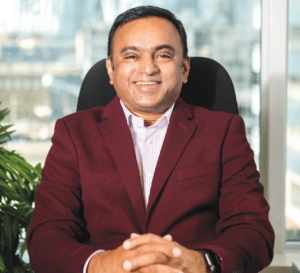
During the COVID 19 pandemic, Vijay led a rapid pivot to remote work with deep sensitivity to employee well-being. Teams were supported through tech enablement, secure access measures, and flexibility. His anecdotal humour – even noting missing office plant watering – underscored empathy and shared responsibility during uncertain times.
Beyond formal recognition, Tangentia’s internal ethos emphasizes employee-led initiatives. From the email quiz “Jigyasa,” born in Goa and expanding nationally, to internal talent programs and social activities, Vijay fosters creativity, curiosity, and community in the workplace.
Employees repeatedly praise Tangentia as more than a workplace – it’s a learning ecosystem. On LinkedIn, a former junior RPA/AI developer shared admiration for mentors and the growth opportunities under his leadership: “We’re a learning circle − Tangentia wasn’t just a workplace, it was a launchpad,” the comment read.
Vijay also extends his people-first philosophy externally through mentorship, community engagement, and startup investments via Tangentia Ventures – supporting early-stage entrepreneurs, especially in Canada-India corridors, with both capital and human-centric guidance.
• People-First Leader
• Empathetic and Adaptive Entrepreneur
• Mentorship and Ecosystem Builder
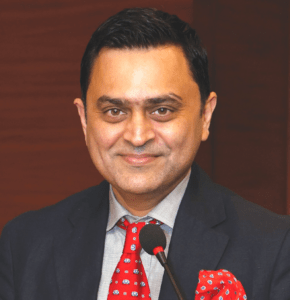
Under Bandekar’s leadership, Big Banner has produced notable Goan films, including #MOG!, which premiered at the International Film Festival of India 2023, and featured in the NFDC Film Bazaar alongside works like Pedru Poder and Ishq Tera. His inclusive approach blends regional talent from Goa, the South, and Mumbai, while investing in global-standard studio infrastructure. He creates structured, respectful spaces that offer local professionals real career pathways.
As GMA Chairman, Bandekar focuses on industry-academia collaboration, inclusive learning, and ethical leadership. During GMA’s 49th AGM, he highlighted continuity jubilee preparations. He chaired the GMA LeaderTalks on Sustainability in Waste Management, centering discussions around community-driven environmental stewardship.
Bandekar is driving initiatives like “Shaping Young Minds”, connecting management students across Goa with industry leaders to bridge academic and professional gaps. Under his leadership, MoUs were signed with several colleges to offer internships, mentorship, and real-world exposure–empowering youth to thrive in the business ecosystem.
Through the Bandekar Charity Foundation, he supports grassroots initiatives. Notably, in Vasco, the Foundation set up a “Medical Equipment Bank” providing free wheelchairs, oxygen concentrators, and mobility aids – prioritizing community well-being over profit.
Deepak Bandekar exemplifies leadership grounded in empathy, opportunity, and service – placing people at the heart of every venture.
• Drives creative excellence in regional cinema
• Advocates ethical, collaborative leadership through Goa Management Association
• Champions youth mentorship and grassroots philanthropy
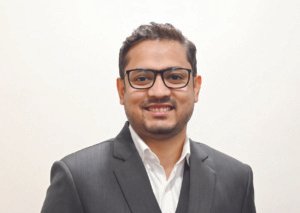
CodeMax has grown from a 10-person team to over 500 professionals globally, yet many original team members remain–reflecting the loyalty and camaraderie Mayur fosters. He attributes success to the collective strength of the team, not individual titles.
Employees describe CodeMax as flexible, fun, and supportive, with ‘Fun Fridays’, open communication, and a low-stress environment. This culture reflects Mayur’s belief in respect, creativity, and equal growth opportunities, regardless of role or tenure.
Mayur places mentorship at the core of CodeMax. Cross skilling double as learning tools, and experienced team members guide new hires in a feedback-rich environment. Project design is collaborative, with clear, transparent workflows.
CodeMax’s engineering practices – like CI pipelines, modular design, and documentation – aren’t for control, but to ensure clarity and autonomy, empowering teams to pursue excellence with confidence.
By situating CodeMax in Goa, Mayur intentionally created an ambience that encourages work-life balance. The serene environment supports deep focus and well-being, a foundation for sustainable innovation.
Mayur extends his mentorship beyond CodeMax. He is an angel investor, mentor at Silicon Valley’s Founder Institute, and
member of CII Goa’s State panel; and
Co-convenor IT & Startup Panel; Head representative for IACC, Goa − helping connect global startup insights with local talent.
Mayur Virkar leads CodeMax as more than a tech company – it is a nurturing, purpose-driven institution where people come first.
• Builds a culture of trust and collaboration
• Empowering teams through autonomy, and continuous learning
Vivek believes that empowered teams drive customer delight. His commitment to staff loyalty is evident in the long tenures of original employees. The company fosters careers over transactional jobs, encouraging long-term growth and shared purpose.
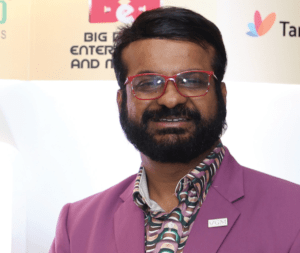
Vivek’s leadership style is structured yet supportive. With his “meet before the meeting” mindset, he ensures every interaction is prepared and purposeful. Regular director meetings and internal mentorship help staff grow technically and professionally, allowing future leaders to emerge from within.
Balancing discipline with empathy, Vivek promotes a culture of camaraderie, autonomy, and work–life integration. This helps retain skilled professionals, even as the company spans multiple domains and cities.
Through the Mendonsa Foundation, Vivek extends his people-first philosophy to society. The Foundation supports disadvantaged youth via vocational training, employment aid, and medical initiatives like cleft and clubfoot surgeries – building individual dignity through action.
Vivek practices “Unequal Contribution; Equal Compensation” to ensure fairness. Everyone’s role, whether visible or behind the scenes, is equally respected. This nurtures ownership and promotes inclusive growth.
- Prioritizes employee dignity
- Encourages structured mentorship
- Extends his people-centric ethos to society
In 2001, Sardessai invested in multi-axis filament winding – then novel in India. That foresight laid the foundation for Kineco’s defence and space verticals. Similarly, the ambitious but commercially unsuccessful Skybus project in 2003 yielded vital R&D insights that later enabled success in rail composites, such as the Vande Bharat train and Chandrayaan programme.
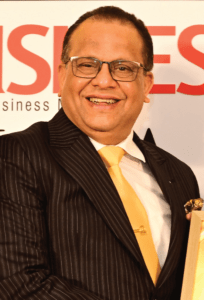
In 2013, Kineco formed a joint venture with Kaman Aerospace (USA), strengthening its presence in aerospace and defence. A 2021 JV with Finland’s Exel Composites opened new frontiers in wind energy and telecom. By 2024, Kineco acquired Kaman’s 49% stake, making Kineco Kaman fully Goan-owned.
In January 2025, it acquired Semvac (Denmark), gaining direct access to European rail markets and expanding under the Kineco Global Rail brand.
From India’s first commercial sonar dome to Vande Bharat’s composite nose cones, Kineco’s indigenous innovations are developed entirely in Goa using advanced global techniques like resin infusion, pultrusion, vacuum bagging, and filament winding. These capabilities are built through a culture of learning, investment, and experimentation.
Sardessai’s approach balances strategic vision with risk mitigation. Kineco now explores next-gen materials for hydrogen fuel tanks and wind energy, positioning itself as a global leader in sustainable composites.
Shekhar Sardessai exemplifies how innovation, adaptability, and vision can transform a regional enterprise into a global industrial leader.
• Long-term R&D investments despite market uncertainty
• Failures converted into high-growth verticals
• Global JVs with full local ownership and autonomy
GKB Hi-Tech became India’s first producer of progressive lenses, hi-index lenses, and multi-coated (anti-reflection) lenses. The brand introduced cutting-edge CNC and auto-generation machinery from global leaders, positioning itself at the forefront of optical precision and quality in India and abroad.
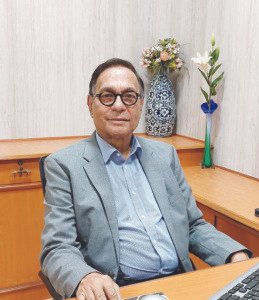
Recognizing the uniqueness of each lens prescription, GKB Hi-Tech has developed a centralized server-based IT system to manage real-time orders, production, and logistics. This enabled same-week delivery across India and 50+ countries, even as order volumes and complexity surged.
GKB Hi-Tech now manufactures and exports 25,000+ lenses daily to 50 countries, with manufacturing units in UAE, South Africa and Israel besides India. This geographic flexibility helps the company rapidly adapt to global market shifts. Today, 35% of GKB Hi-Tech’s revenues stem from long-term B2B partnerships with global retail and online eyewear brands.
GKB Hi-Tech fosters a people-first innovation culture, encouraging cross-functional role rotations every 2–3 years. “Programs like the “Mastermind Award” motivate employees to suggest improvements and innovations, embedding agility and ideation into everyday workflows,” says son Neeraj.
M K Gupta exemplifies how visionary leadership, systems thinking, and innovation culture can build a future-ready global enterprise from Goa.
• Tech Leadership: First to bring in India advanced lens technologies
• Digital Systems: Real-time logistics across 50+ markets
• Integrated Model: Lenses + frames = complete value chain
• Global Growth: Agile exports and international presence
• Culture of Ideas
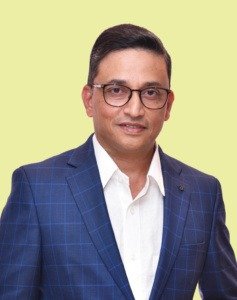
Tanmay focused on innovation from day one. He built a multi-segment platform offering a diverse portfolio, from affordable urban apartments to luxury villas and plotted developments. This diversified approach has allowed Manas Developers to serve a wide customer base without compromising on design or cost-efficiency.
Projects like Miramar Towers, Lotus Towers, Casa Salvador (Salvador Do Mundo), Renata (Moira) and upcoming developments in Bambolim, Miramar, Taleigao in North Goa and a large commercial/residential project in Fatorda, Margao in South Goa, reflect a thoughtful balance between city access and scenic living. Tanmay collaborates with top architects in Goa and beyond its shores to bring site-specific design excellence to each project.
Each project becomes a learning opportunity, helping Manas Developers improve processes, delivery timelines and client communication. This adaptability has been crucial in navigating Goa’s evolving regulatory and environmental landscape while maintaining consistent quality.
Tanmay’s leadership is grounded in modesty and teamwork. He credits his parents’ mentoring for instilling values rooted in trust, which now define Manas Developers’ client and partner relationships.
Beyond real estate, Tanmay co-leads clean energy startups Arcis and Blive and channels community engagement through the KAYAM Trust, supporting education, sports and healthcare in Goa.
As a passionate sports enthusiast, Tanmay actively supports young athletes by sponsoring the Manas Panjim Gymkhana cricket team and fielding his own team, the Manas Mavericks, in the Panjim Gymkhana Members League. Taking this spirit forward, he has launched the Manas Sports Arena at Panjim Gymkhana, featuring two world-class pickleball courts, reaffirming his commitment to promoting emerging sports like pickleball
• Versatile and Innovative Builder
• Grounded in humility and lifelong learning
• Supports clean energy ventures, education and sports initiatives, and promotes emerging sports
Sushant’s leadership has brought a fully integrated model to the company, combining design, fabrication, and logistics under one roof. TPT’s state-of-the-art workshop and in-house studio allow for rapid iteration, greater accuracy, and seamless coordination – critical for delivering complex projects like trade show pavilions or luxury retail setups with precision.
As client demands and market conditions shifted – especially during the COVID era, Sushant led the adoption of digital tools, remote coordination, and modular design strategies. These innovations enabled quicker deployment, asset reuse, and reduced costs – ensuring that TPT remained resilient and responsive amid disruption.
To maintain excellence while scaling, Sushant established quality control protocols, detailed fabrication standards, and structured client feedback loops. This ensures project transparency, on-time delivery, and consistency – building long-term trust across both event and retail sectors.

Sushant fosters a learning-oriented environment that reviews and refines processes.
Sushant Tari has proved that hard work, strong work ethic and the gumption to think big can make one play the long game in business.
• In-House Integration: Combines design, fabrication, and logistics under one roof for seamless execution
• Digital Adaptation: Leverages remote co-ordination and modular setups for agility and efficiency
• Quality Culture: Transparent timelines and consistent delivery build trust and repeat clientele
Their “affordable luxury” philosophy emphasizes subtle touches: soothing aromatics, Indonesian soundscapes, bespoke interiors, and personalized menu options. This operational focus cultivates a signature customer journey that locals and tourists seek.

Archana and Sumeet Bhobe have built operational excellence in guest-facing systems: seamless multi-location management, service quality, supplier alignment, and brand-consistent experiences
Porvorim and Calangute to Bambolim (Grand Hyatt Goa). Their operational excellence is grounded in four core pillars:
1. Consistent Multi-Location Experience
Over 26 years, Snip expanded to four strategically placed outlets, delivering uniform ambiance, service standards, and quality across locations, each branch adheres to the same high standard.
Facilities feature well-trained therapists administering services with professionalism and polish. Customer feedback highlights friendly, highly skilled staff delivering manicures, pedicures, facials, and massages with precision and care.
Snip offers a thoughtfully curated suite of services: L’Oréal Professionnel, Kérastase hair treatments, Pahadi Local facials, and international nail products like Blue Sky. This reflects strong vendor partnerships and excellent inventory control to provide consistent, high quality offerings.
Archana and Sumeet Bhobe have built operational excellence in guest-facing systems: seamless multi-location management, service quality, supplier alignment, and brand-consistent experiences.
• High-quality and consistent service across multiple locations
• Invests in continuous staff training
• Curated global product partnerships
• Combines ambience, personalized touches, and sensory elements to create an “affordable luxury” experience.
At the core of Furtado’s approach is rigorous supply chain control. Fresh seafood is sourced daily from local markets, displayed on the rack, and prepared by trained chefs under strict hygiene and flavour standards. This discipline ensures flavour consistency and freshness across all outlets and seasons.
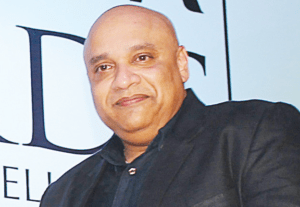
From plating and music to ambience and menu curation, every detail is standardized. Even during COVID-19, Furtado maintained guest trust by swiftly implementing sanitization, digital menus, and vaccination protocols, reflecting a system-driven, resilient culture rooted in guest safety.
Expanding across Goa and India, Furtado ensured that each new The Fisherman’s Wharf outlet stayed true to the original’s spirit – preserving Goan décor, live music, menu variety, and warm hospitality. Each unit adheres to a replicable operational blueprint, delivering a familiar, reliable experience city after city.
Online reviews, especially on TripAdvisor, repeatedly highlight the fresh seafood, friendly staff, and inviting atmosphere. Guests note consistent delivery even during peak times, a testament to strong cross-functional coordination from kitchen to floor.
• Ensures freshness and flavour through disciplined supply chain
• Preserves Goan cultural essence – décor, music, and hospitality
• Delivering consistently high service and ambience
Rajesh Sheth has embedded a culture of quality and timely execution across every project – from Nova Cidade townships and Serene Woods villas to Grande Torre apartments near Miramar. The group is widely trusted for delivering properties with precise finishes, robust infrastructure, and dependable timelines, earning repeat customers and referrals.
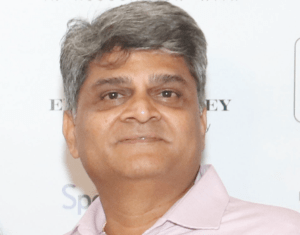
Each development begins with rigorous feasibility analysis, securing all regulatory clearances before launch. Rajesh ensures detailed phased execution plans, enabling efficient handling of multiple projects simultaneously with minimal delays or cost overruns. This disciplined model is key to maintaining trust among buyers and stakeholders.
Jai Bhuvan projects integrate modern amenities and sustainable features, such as home automation in Grande Torre and green design in Sonhe Vagator. Yet, all developments follow standardized quality assurance protocols, ensuring every innovation meets the brand’s delivery standards.
Rajesh has led strategic expansion into verticals like retail (Mall De Goa), hospitality (Hotel Orion), and education (Jnyan Vikas School). Despite diversification, all arms operate under the group’s core discipline of quality and timely delivery. The opening of Mall De Goa in 2016 – Goa’s largest mall – demonstrated their capacity to handle large-scale, complex builds.
Internal ratings reflect a collaborative, growth-oriented work environment, scoring 4.9/5 in employee feedback. Strong coordination across engineering, procurement, and execution teams reinforces system reliability and operational excellence.
Rajesh Sheth has institutionalized excellence across Jai Bhuvan Builders, turning operational consistency into a competitive edge in Goa’s urban transformation.
• Strong track record across real estate and retail verticals
• Delivers advanced features while maintaining consistent execution standards
From the beginning, Arman emphasized operational precision. The group has its own processing plants, modern warehousing, and an in-house analytical lab – ensuring product consistency and providing test reports with every shipment. This vertical control spans a wide range of products: manganese, quartz, lightweight bricks, fly-ash bricks, ecological sand, ready-mix mortars, fire-prevention systems, and biofuels.
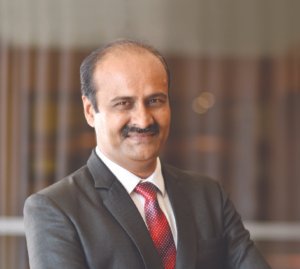
When Goa’s mining sector collapsed in 2012, Arman pivoted from raw minerals to cement-based manufacturing. He was the first in Goa to supply precast cement blocks for Dabolim Airport – establishing AR-Mine’s as a go-to partner for infrastructure.
Despite global headwinds, exports have grown from 10% to 35% of turnover, reaching markets in Africa, Vietnam, Korea, Nepal, and the Middle East. AR-Mine’s remains a trusted supplier for Goa’s top builders and public projects like the new airport terminal and stadiums – testament to its delivery consistency and operational systems.
People-First Philosophy
Even during economic downturns, Arman retained his workforce, reinforcing a culture of trust, loyalty, and resilience. His leadership balances process-driven discipline with people-centric values, a rare combination in industrial manufacturing.
As President of Vibrant Goa Foundation; Senior Director (Business Growth) at BNI Goa; and former Director at Goa Industrial Development Corporation, Arman shapes broader industrial policy – bringing his structured, excellence-focused ethos into governance.
AR-Mine’s, under Arman Bankley, is a blueprint for resilient, system-driven industrial success – rooted in Goa, scaling globally.
• Quality-Control Systems: Operates in-house laboratories,
• Strategic Diversification: Expanded into cement and infrastructure products, Pro-active response to post-mining industry collapse
• Workforce Resilience: No layoffs during downturns. High levels of employee loyalty and retention.
Surlaker’s vision is today carried forward by his son; Sunny Surlaker who is scaling up the company which has mastered ISO 9001:2015 quality processes, ensuring consistently high standards – from sourcing raw materials to final dispatch. Assess Build Chem Pvt Ltd has deep expertise in admixtures, waterproofing, specialty coatings, concrete repairs, and soil stabilization enables streamlined manufacturing workflows, minimizing defects and maximizing output.
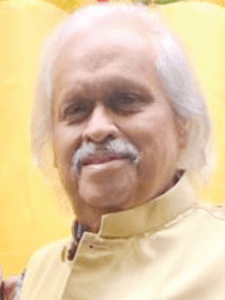
The Company prides in rapid decision making and responsive service – anchoring operations in real time problem solving. Clients benefit from precise technical consultation, tailored chemical solutions, swift dispatch from well stocked Goa facilities, and a nationwide applicator network. This flexible, consultative approach ensures ABCPL meets tight timelines and urgent project requirements efficiently.
More than an industrialist, Samir serves as a mentor and educator. He has authored technical papers, delivered lectures, and engaged actively in skill upliftment across the industry. Such knowledge-sharing strengthens ABCPL’s internal talent pool and creates a culture of operational rigour and continuous improvement.
In September 2024, Samir Surlaker was honored with the Lifetime Achievement Award by the Waterproofers Association of India (WAI) – a testimony to his sustained impact on standards and excellence in the waterproofing and construction chemicals domain.
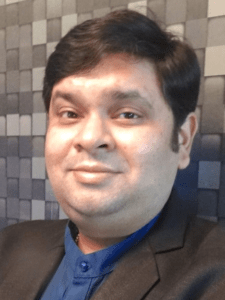
Assess Build Chem Pvt Ltd approach links operational excellence with sustainability. Through innovative coatings like ProtectoCon AC – which offers crack bridging, UV resistance, and solar reflectance – ABCPL enhances the durability of structures, reducing maintenance cycles and environmental impact.
Samir and Sunny Surlaker’s operational excellence is rooted in technical mastery, process rigor, customer responsiveness, and a learning culture. By integrating high quality manufacturing, fast logistics, expert advisory services, and sustainability, they elevate Assess Build Chem to stand among India’s trusted solution providers in construction chemical innovation.
• Combines four decades of expertise with ISO-driven quality systems
• Champions responsive, consultative service backed by robust logistics and a nationwide applicator network • Fosters industry advancement through education, innovation, and eco-conscious product development that enhances structural durability
The Group’s hospitality brands – Nanu Beach Resort & Spa (Betalbatim), Nanutel Margao, and Nanu Resort, Arambol – are known for maintaining high service standards across varied settings. Their Betalbatim resort, with its beachside charm and cottage layout, regularly earns praise for its attentive service, warm hospitality, and predictable guest experience.
A TripAdvisor review summed it up: the resort “runs a tight ship” – indicating operational rigor, trained staff, and service that often anticipates needs before they are expressed. Standardized processes and guest-centric routines ensure repeat visits and brand trust.
Nanu Estates Pvt. Ltd. has completed over 90 residential and commercial projects in Goa, consistently delivering on time and as promised. This has positioned the firm as one of Goa’s most trusted developers.
Their formula: disciplined project planning, transparent dealings, and smooth handovers – minimizing client uncertainty and maximizing satisfaction. Whether in Margao, Fatorda, or Betalbatim, or anywhere in Goa, buyers know what to expect.
The Group follows a “cautious but active” expansion model –testing ventures before scaling and prioritizing stability over speed. This ensures no compromise on quality or focus, even as they diversify.
Nanu Group’s steady growth and operational clarity make it a quiet yet powerful force in Goa – earning long-term trust through consistency, quality, and low-key excellence.
• Implements common protocols across hospitality brands
•Ensures real estate projects are handed over as per committed timelines
•Scales operations after validating each concept
•Maintains discipline
approach rooted in trust, empathy, and consistent service. As a business which is nearing a century, his mission is simple: every visitor should leave with a smile, whether they make a purchase or not. And Ulhas Jewellers derives its trust and goodwill for nearly a century, due to their willingness to their customer-centric approach.
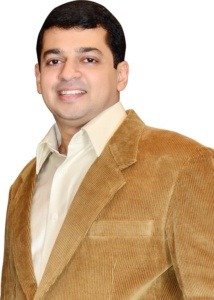
Ulhas Jewellers operates on a consultative model. Vikram trains his staff to guide rather than push customers, fostering honest conversations and building long-term relationships. Ulhas Jewellers was the first jewellery store in Goa to earn the TrustMark, reinforcing its commitment to transparency and quality.
volume. In-store, customers experience individualized service in elegant, non-counter spaces where consultants
provide personal attention.
Vikram redefined Ulhas Jewellers’ product strategy by shifting entirely to focus on quality which has driven annual growth in the gold category and strengthened the brand’s reputation for excellence and integrity.
Vikram actively connects Ulhas Jewellers with Goan culture by sponsoring local events. He extends his customer-first philosophy to community initiatives such as blood donation drives, reinforcing the brand’s roots and social relevance.
V i k r a m V e r l e k a r ’ s leadership shows that genuine care, premium quality, and cultural connection create a jewellery brand that customers trust – and return to.
• Empathetic, pressure-free customer interaction
• Limited, thoughtfully crafted events
• IGI-certified diamonds and strict quality control
• Transparent policies and personal engagement
• Community events and social initiatives
London, he returned to Panjim to oversee operations with the goal of modernizing Goa’s retail and F&B landscape.
From the outset, Shamik prioritized direct exposure to frontline operations – spending his first year rotating across
departments at Caculo Mall, engaging with customers, vendors, and staff at ground level. This hands-on immersion helped shape his operational philosophy: experiences should be seamless, memorable, and firmly centered around the guest.
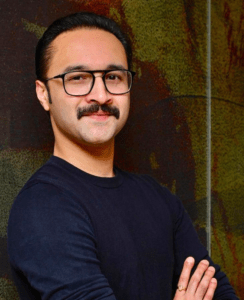
Under his leadership, the Mall’s operations emphasize these core customer-centric tenets:
Journey-first design: Whether arriving for retail, dining, or events, patrons enjoy thoughtful navigation, ambient comfort, and intuitive layouts that minimize friction and enhance dwell time.
Feedback loop integration: Shamik has championed real-time feedback mechanisms – through digital kiosks, social media, and staff-facing reporting tools – enabling prompt responses to service gaps and evolving consumer needs.
Localized experiences: He blends global retail and hospitality standards with regional aesthetics – curating local art, events, and pop-up stores to reflect Goa’s unique culture while ensuring consistent service quality.
• Leads with a hands-on, guest-centric approach that prioritizes seamless, intuitive, and memorable experiences across retail and hospitality
• Aligns staff, vendors, and partners through standardized training and shared service goals, ensuring consistent quality and customer satisfaction.
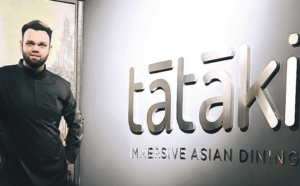
Beyond Tataki, Akshay has expanded his culinary ventures across India. He launched Shoyu, a premium cloud kitchen and QSR brand, with its flagship in Hyderabad and expansion underway in Bangalore and Delhi. He also founded Banaba, a restaurant brand crafted for tier-two and tier-three Indian cities, with its flagship at Sayaji, Kolhapur. In Goa, Akshay has partnered with Dynamix Group under Dynamix Tataki LLP, the operating entity for all F&B offerings at Clube De Palma, Bambolim.
Tataki is crafted as an immersive journey. From the elevator exit, guests step into a striking space with live music, a sushi bar, signature cocktails, and artful lighting – all enhancing the overall dining experience. Its ambiance and attention to detail regularly earn top marks for hospitality and décor.
Akshay emphasizes warm, proactive service. Staff are trained to anticipate needs, suggest pairings, and create memorable moments. Guests often recall team members for their attentiveness – a reflection of Tataki’s service culture.
Tataki’s menu features East and Southeast Asian dishes like sushi, dumplings, and Pad Thai, tailored to Goan tastes. Carefully sourced ingredients ensure both freshness and authenticity, earning the brand a loyal following.
As NRAI Goa’s co-chapter head, Akshay supports in-house service models over third-party aggregators to protect quality and margins. His focus is on delivering consistent, high-touch experiences that build trust.
Akshay Quenim symbolises that true hospitality is about crafting emotionally resonant guest experiences – every single time.
• Immersive ambience: Curated décor, music, and hospitality
• Attentive Service: Staff trained to personalize and anticipate
• Authentic Menu: Fresh, tailored Pan-Asian cuisine
Every decision – from inventory to store layout – is driven by a deep understanding of local consumer needs.
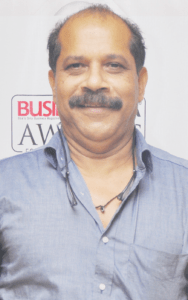
Since launching Delfino’s Hymart in Porvorim in 2015, Prakash prioritized freshness, especially in meat and seafood. Early losses in perishables didn’t deter him – instead, he recalibrated operations, boosting daily sales in two years by ensuring quality and consistency.
Personally involved in food category supervision, he ensures hygiene and freshness are maintained.
Delfino’s product mix –ranging from cooked meals and farm produce to linens and pet supplies –reflects a curated approach to convenience and quality.
To Prakash, Delfino’s isn’t just a store – it’s an experience. The Taleigao outlet, spanning 7,000 sq ft, was developed with insights from younger family members. Features like open bakeries, wide aisles, and thoughtful design encourage relaxed shopping.
His management style is deeply hands-on. He monitors inventory, tracks yields, and maintains strict control over operations. “Businesses like this has to be micro-managed. Without control, you are living in a fool’s paradise,” he notes.
Prakash has navigated major market shifts – demonetization, GST, and liquor regulations – without losing momentum. By anticipating customer behaviour, stocking in advance, and maintaining service continuity, he has ensured consistent growth.
He steers clear of franchises and venture funding, favouring full ownership. This approach preserves brand identity, ensures consistent service, and allows for agile decision-making.
Through Champs and Delfino’s, Prakash Pereira has redefined Goan retail – where service, quality, and customer insight take center stage.
• Freshness & Quality: Focus on hygienic produce
• Designed spacious, clean stores with diverse product offerings.
• Personally monitors inventory with micro-managed, section-wise analysis.
• Resilience to Change: Maintained growth through challenges like GST and Covid-19
• Controlled Expansion: Chooses owned outlets to preserve trust, flexibility, and brand integrity.
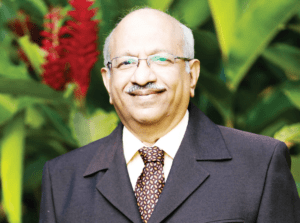
Naik inherited a traditional family business in a new-age Goa; and rebuilt it through disciplined risk-taking, frugal management, and conservative borrowing. Even as his ventures flourished, he famously continued driving a modest car – symbolizing his grounded approach. Naik has focused on steady development.
Commonwealth Developers is respected across South Goa for timely delivery and quality construction. The company’s financials reflect transparent management and discipline, showcasing strong payment ethics and control.
Monginis Goa now operates 74 outlets (most operating on a franchisee model) across the state, supported by a modern feeder facility in Verna. Its growth, achieved largely through reinvested earnings and careful scaling, avoided equity dilution or heavy debt. Naik’s approach ensures long-term sustainability over rapid, high-risk expansion.
Naik consistently prioritizes self-reliance, gradual growth, and community responsibility. He avoids overextension, funding ventures primarily through retained earnings. This model provides operational resilience even during market volatility.
His profits also fund social and cultural initiatives – including contributions to the Konkani Bhasha Mandal.
Datta Damodar Naik’s legacy is one of sustainable leadership – where transparency, caution, and social impact go hand-in-hand with business success.
• Frugal Capital Use: Minimal luxuries, profit reinvestment
• Measured Growth: Trust-driven real estate and retail expansion
• Sustainable Financing: Most Monginis outlets operate as franchisees
• Social Responsibility: Cultural support and philanthropic giving
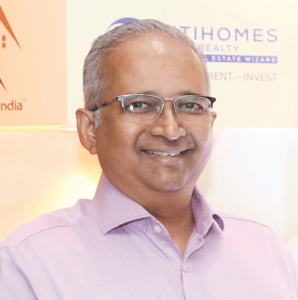
FLY91 chose the ATR 72-600 for its safety, fuel efficiency and lower operating costs. It burns less fuel compared to other aircraft per hour and offers major savings on maintenance and leasing. With aviation driven by cost leadership, FLY91 focuses on smart cost structures, the right yields and niche routes to break even sustainably in a high-demand domestic market.
FLY91 currently operates three aircraft, with a fourth purchased and joining soon. Its five-year plan aims to connect over 50 cities by adding one base each year with five to six aircraft, each serving eight to 10 destinations. Average flight times range from 60 to 90 minutes. FLY91’s lean digital systems, including a 19KB boarding pass and auto check-in, reduce emissions and energy use without sacrificing reliability.
FLY91’s in-house designed, gender-neutral uniforms reflect Goa’s spirit, with name tags in regional scripts. Nearly 300 employees, including 40 pilots, form its growing team. Backed by UDAN, FLY91 connects smaller towns with confidence. Its brand identity captures the aspirational spirit of ‘Bharat Unbound’ and India’s country code, +91.
FLY91 is a digital-first airline with no call centres, using chatbots and auto check-in to simplify travel. Its 19KB digital boarding pass is delivered instantly via WhatsApp or email. UPI payments are accepted at all touchpoints, and bookings are accessible through major agents nationwide. A mobile-first platform, powered by AI bots and automated systems, ensures seamless customer experience and efficient operations. This tech-led model enhances convenience, cuts costs and supports scale across tier 2 and 3 cities. FLY91 currently connects Goa to underserved destinations like Solapur, Jalgaon, Sindhudurg and Pune in Maharashtra, connectivity hubs like Hyderabad and Bengaluru as well as the stunning, but remote Agatti island in the Lakshadweep chain of islands.
• Low Leverage: Fully equity-funded with UDAN support
• Fleet Efficiency: Standardized ATR 72-600 platform
• Controlled Growth: Six aircraft by FY25; Plan for 30 in five years
• Cost Discipline: Digital-first ops, lean staffing
• Route Focus: Profitable, VGF-backed regional sectors.
Rajkumar G. Kamat, the Founder & MD of EP Biocomposites Ltd., leads the Goa-based engineering firm with a strong fiscal discipline and a focus on sustainable growth. Specializing in bio-digester toilets, FRP and fire doors, and wastewater treatment systems continuously contributing to a Clean, Green and Safe planet. Kamat, who was recognised as the Businessman of the Year for Excellence in Green Business has built a resilient company known for its low leverage, solid governance, and efficient use of capital.
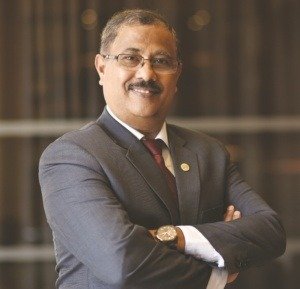
As of March 2024, EP Biocomposites maintained a debt-to-equity ratio of just 0.18×, with long-term debt at 0.12× – well below industry norms. This reflects Kamat’s conservative approach, prioritizing internal accruals over risky external borrowing.
The company has delivered strong results, with net profit margins over 10% and operating margins around 12-13% in FY24. Return on Equity (ROE) and Return on Capital Employed (ROCE) stood at 12% and 15% respectively. Interest coverage neared 40×, highlighting strong cash flow management and financial buffer.
Between FY23 and FY24, revenue nearly doubled – from `7.11 crore to `11.66 crore – and net profit grew to `1.15 crore. Importantly, the company issued no dividends and avoided dilution, choosing instead to reinvest profits. This self-funded growth strategy has helped the company scale without compromising financial strength.
Kamat emphasizes strict governance: no related-party loans given, no unnecessary asset holdings, and all borrowings used solely for project needs. These practices, rare in closely-held companies, foster long-term investor confidence and operational clarity.
EP Biocomposites went public via an SME IPO in 2022 and has since grown its Green Offerings and Customer base. Its net worth crossed `10 crore, with book value per share increasing from `50 to `56 in FY24 – further proof of value creation without leverage.
Rajkumar Kamat proves that responsible finance is key for sustainable growth.
• Minimal Leverage: Debt/equity under 0.2
• Reinvestment: No dividends; profits used for growth
• No promoter loans, clean operations
• All borrowings used solely for project needs
• Conservative approach to finance
build3 typically invests `1–5 crore per startup, using a mix of equity and debt via HNI syndicates and corporate capital. Investors contribute a minimum of `3 lakh each – along with their time and expertise – ensuring aligned, long-term value creation while keeping transactional overhead low.
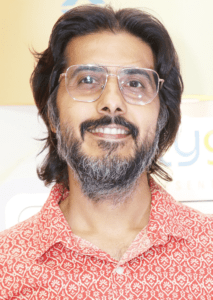
Instead of aggressive scaling, build3 focuses on consistent impact. Its accelerator offers `25 lakh in MVP-stage funding in return for a 15% discount to the next round funding – prioritizing founder quality over quantity. To date, over 125 startups have been incubated, with 22 receiving capital – highlighting disciplined investment choices.
To avoid dependency on long equity cycles, Chawla is expanding build3’s revenue by offering services in hiring, product development, strategy, and fundraising. Rather than scaling payroll, he partners with domain experts and agencies, maintaining lean operations and financial flexibility.
Calling himself an “institutional co-founder,” Chawla works closely with startup teams on financial forecasting, planning, and execution – ensuring businesses grow with maturity and control. His prior experience scaling 91springboard with infrastructure and cost discipline informs his approach today.
Varun Chawla shows how fiscal discipline and social purpose can drive sustainable startup success – a compelling story for Goa.
Sriram Natarajan, Director and CEO of Molbio Diagnostics, has led Goa’s first unicorn with a firm commitment to financial discipline. Known for its flagship Truenat PCR testing platform, Molbio has balanced innovation with fiscal prudence – adapting swiftly to shifting market dynamics.
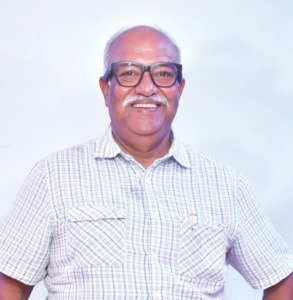
Molbio’s revenue surged to `776 crore with `215 crore profit in FY22 during the pandemic, before dropping to `332 crore in FY23, resulting in a minor `3.4 crore loss. Despite the dip, Molbio stabilized quickly, reporting a strong rebound of `837 crore in FY24.
The company has marquee investors such as Temasek and Motilal Oswal who invested in the company in 2022 and 2020 respectively. They collectively own approximately 21-22% stake in the company having jointly invested over 900 Crores through a combination of primary and secondary transactions. Key promoters and the founder group own more that 70% stake and have maintained low leverage at Molbio Diagnostics showing a preference for equity over excessive debt, reflecting long-term thinking over short-term funding gains.
In response to FY23’s revenue decline, Molbio cut raw material purchases by nearly 40% and scaled down operating costs. The expenses-to-revenue ratio rose from `0.63 in FY22 to `0.99 in FY23–an effective response to contraction. By FY24, margins improved as operations were recalibrated.
Instead of overspending, Molbio has reinvested retained earnings into strategic growth moves – like acquiring 65.47% of Prognosys Medical Systems in 2023 and partnering with Testi Technologies for saliva-based diagnostics. These steps align with its mission without burdening the balance sheet.
With reported IPO plans, Molbio continues to show restraint and clarity in fundraising, ensuring capital is raised with defined purpose and discipline.
Under Natarajan’s leadership, Molbio proves that sound financial management can empower sustained innovation.
• Fundraising with promoter strength intact
• Expenses aligned to revenue cycles
• Stability through market volatility
• Acquisitions via internal resources
• Cautious IPO Planning
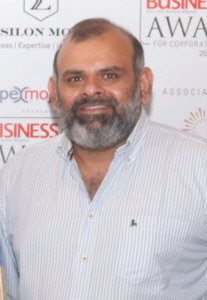
In 2023, Varun launched the group’s first hotel outside Goa – Radisson Blu Pune Hinjewadi, in partnership with Radisson Hotels.
Targeting Pune’s IT corridor, the hotel reflects his vision for geographic diversification without compromising the group’s hospitality standards. He continues alliances with global brands like Accor’s Mercure Goa Devaaya and Novotel Dona Sylvia.
During the COVID-19 pandemic, Varun chose to retain the group’s 1,700 employees, redeploying them for property upgrades instead of layoffs. Hotels like Dona Sylvia and Devaaya were reimagined–converting wellness zones into luxury wedding venues and adding a new conference hall for 800 guests, tapping into the rising wedding tourism market.
Varun is leading the modernization of Victor Hospital and Victor Cancer Care Centre, positioning the group as a serious player in Goa’s healthcare sector. Simultaneously, Devaaya is evolving into a medical wellness destination, combining hospitality with integrative healthcare.
Generational Transition and Cultural Continuity
Varun is expanding boldly while preserving the group’s Goan identity and values.
Under Varun’s leadership, Alcon Victor Group exemplifies growth anchored in foresight, resilience, and heritage.
• Geographic Diversification: Radisson Blu Pune expansion
• Asset Resilience: COVID-era upgrades, destination weddings
• Healthcare Integration: Modernized hospitals and wellness resorts
• Legacy & Brand Continuity: Gen-Next leadership rooted in family values
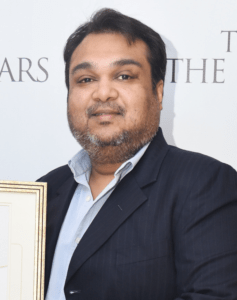
JGI began with broking Steel Ingots and Billets , upgraded to trading TMT bars and soon added hot rolled coils, cold rolled sheets and value added services by setting up his own in-house decoiling, profiling, and stocking operations. A strategic alliance with JSW Steel in 2009 elevated JGI to an authorized distributor, significantly strengthening its credibility.
Seeing the limitations of raw trading, Goyal invested in advanced machinery and infrastructure.
In 2022, JGI launched JGI Metal Convertors (JGIM) in Sri City, Andhra Pradesh –a modern greenfield factory with a processing capacity of one million tons per annum, a state-of-the-art coil processing centre that offers slitting, cut-to-length, profiling, warehousing, and custom automatic packaging. This geographic expansion supports Goyal’s goal of servicing the end consumers who require high degree of customisation along with just in time services and highly precise quality. Some of the customers in Sricity are Bluestar, Havells, Daikin, Voltas among other brands.
By 2024-25, JGI was handling 115,000 tonnes annually, serving sectors such as automotive, appliances, infrastructure, and real estate.
Goyal’s “Growing Our Tomorrow” vision focuses on steady, value-based growth and client-centric strategies. JGI group has overcome the common challenges that steel industry faces like cyclic demand and working capital intensity and achieved stability through structured credit, investment discipline, long-term planning and Quality Service to End customer.
• From trading to full-scale service centre
• Value Addition: In-house processing and customization
• Geographic Reach: New Andhra Pradesh plant
• Financial Stability: Strong credit rating and rising net worth
• Growth Focus: Capital-backed, long-term planning
Real estate was the group’s starting point. Rajesh emphasized premium, well-planned projects in locations like Porvorim, Miramar, and Siolim. From apartments to luxury villas, developments like Vision Galleria and Dream City were tailored to specific market needs, ensuring high customer satisfaction through ethical pricing and quality delivery.
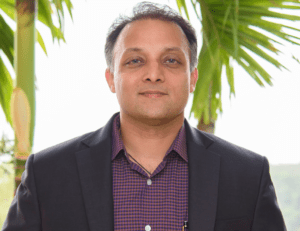
Beginning with The Crown Goa, Rajesh expanded into the boutique-luxury segment. The growth has been intentional – focusing on unique guest experiences, consistent service, and brand strength over time, avoiding overextension and maintaining profitability.
Vision Dempo later launched Dempo Kids for early education and Wisdom Superspeciality Hospital in Miramar to fill gaps in advanced healthcare. His ventures in film and theatre further reflect a long-term cultural investment –showcasing Goan stories with national and global relevance.
Rajesh follows a five-year strategic plan based on retained profits and low leverage. Rajesh transitioned from relationship-led operations to professional governance. Today, a core team manages due diligence, acquisitions, and benchmarking – ensuring each decision aligns with long-term goals.
• Builds diverse ventures with disciplined planning, market alignment, and a strong foundation
• Expands across real estate, hospitality, healthcare, education, and culture
• Operates with low leverage, reinvested profits, and a team-driven approach
Rajdeep Builders was the first in Goa to offer fully furnished homes backed by a 5-year repair warranty and a 25-year maintenance plan. Inspired by Rajesh’s own experience with poor after-sales service, this model set a new benchmark. In 2022, he launched Rajdeep Maintenance Services to extend quality maintenance even to third-party projects across a 20 km Panaji radius – with national plans underway.
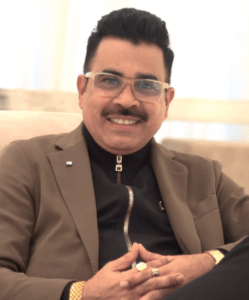
Blending experience in interiors and finance, Rajesh shaped a real estate business built on premium offerings and integrity. Landmark projects like Rajdeep Residency (Socorro), Rajdeep Classic, and Kenkre Residencies are known for quick handovers, durable construction, and fully furnished,
The company’s governance structure includes dedicated teams in design, procurement, engineering, legal, and client servicing. Projects, such as Rajdeep Classic Residency in Taleigao, feature transparent delivery timelines and financing – reflecting structured planning and customer-first thinking.
Rajesh Tarkar’s belief: “If you can’t guarantee quality that lasts a lifetime, you haven’t served your customer” is central to his mission.
His blend of fairness, innovation, and long-term planning has turned Rajdeep Builders into a respected, service-driven brand ready-to-move-in homes – enhanced with guaranteed after-sales support.
• Pioneered fully furnished homes with long-term warranties and after-sales support
• Builds trust through timely delivery, transparent governance, and a strong focus on durable, value-rich housing solutions
As co-founder of Heritage First Goa, Sukhija is committed to conserving Goa’s built and natural legacy. In November 2024, he helped launch the first Heritage First
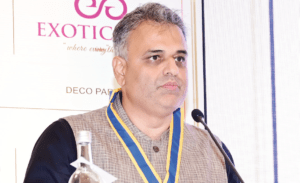 Festival, featuring 32 curated heritage walks and workshops. These immersive programs in architecture, biodiversity, and traditional crafts were aimed to educate communities and spotlight artisans who preserve Goa’s culture.
Festival, featuring 32 curated heritage walks and workshops. These immersive programs in architecture, biodiversity, and traditional crafts were aimed to educate communities and spotlight artisans who preserve Goa’s culture.Sukhija also works closely with the Goa Heritage Action Group, supporting local campaigns to protect historical precincts and architectural landmarks.
As TTAG President, Sukhija promotes eco-friendly reforms. In May 2024, he advocated for better public transport and digital taxi licensing systems to reduce traffic congestion and carbon emissions.
His push for technology-based solutions aims to shift reliance away from private vehicles while ensuring fair pricing for tourists and locals alike.
TTAG, under his leadership, has also called for green investments in culturally sensitive tourism infrastructure, aligning growth with environmental sustainability. On World Tourism Day 2023, Sukhija emphasized the synergy between green practices and heritage protection as central to Goa’s long-term tourism roadmap.
At ITB Berlin 2025, Sukhija presented a renewed vision of Goa, highlighting culinary tourism, temple trails, colonial architecture, and eco-tourism. He stressed digital marketing and cultural storytelling as key tools to attract mindful, heritage-oriented travelers.
Sukhija blends hospitality with purpose – ensuring that Goa’s tourism thrives responsibly and respectfully.
• Heritage First Festival, cultural workshops
• Advocating tech-driven taxi reforms, public transport, as TTAG President
• Focus on culture, culinary, and eco routes
• Green Infrastructure: Advocacy for sustainable development
Phillipose leads transformative environmental efforts such as rainwater harvesting, ultra-filtration sewage treatment, bio-composting, and chemical-free cooling systems. The region-wide ban on single-use plastics, aligned with the “Planet vs Plastics” Earth Day mission, replaced plastic straws, bottles, and amenities with bamboo and reusable alternatives across all IHCL Goa properties.
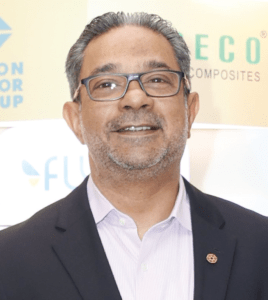
Community collaboration is central to his vision. Initiatives like the “Bench of Dreams” project with Bisleri International – turning plastic caps into benches – and donations of waste collection trucks and bins to the Candolim Panchayat reflect IHCL’s civic commitment. At Cashew Fest Goa 2024, IHCL celebrated Goan culinary traditions in sustainable formats, blending heritage with environmental responsibility.
IHCL Goa’s circular economy initiatives include in-house bottling plants and rooftop solar panels at flagship properties like Taj Exotica Resort & Spa and Cidade de Goa – reducing plastic waste and promoting clean energy. EV charging stations further align with Goa’s green mobility goals.
Globally certified by EarthCheck, select IHCL properties meet rigorous benchmarks in energy efficiency, water conservation, and sustainable design.
Under Ranjit Phillipose’s leadership, IHCL Goa isn’t just redefining hospitality – it’s building a sustainable, inclusive, and future-ready ecosystem rooted in purpose and community.
• Water & Waste: STPs, composting, rainwater harvesting
• Plastic-Free: Eliminated single-use plastics, eco alternatives
• Circular economy initiatives include in-house bottling plants and rooftop solar panels
• Responsible tourism through the IHCL’s Paathya framework
Founded a decade ago by Prahlad and Sabreen Sukhtankar, BSB has become one of Goa’s most trusted culinary names. Their success stems not from loud marketing, but from unwavering adherence to their values. “We don’t believe in greenwashing or gimmicks. Our philosophy is simple: be honest in your food, fair with your people, and conscious of your choices,” says Sukhtankar.
BSB champions local produce and lesser-known ingredients, offering sustainable alternatives like vellyos (tiny local fish) instead of fries. Their seasonal specials celebrate Goa’s biodiversity, featuring unique items like kazari rice from the khazan lands, jackfruit seed salad, and burrata with local jamun. The menu skillfully balances familiarity for regulars with enough novelty to maintain curiosity.
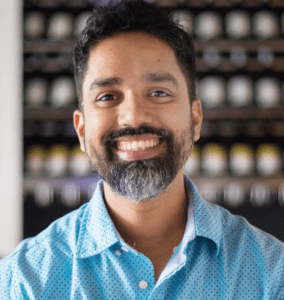
At BSB, sustainability is a comprehensive mindset embedded in every aspect of the business, extending beyond just sourcing. This includes collaborating with local craftswomen for tableware and designing efficient, waste-reducing prep systems. Crucially, the kitchen fosters a culture of dignity, growth opportunities, and respect for its staff, recognizing that a conscious operation starts with its people.
BSB’s growth has been slow and deliberate and every decision is made with a long-term perspective. This rare discipline in the hospitality sector has cultivated strong customer loyalty and ensured longevity. Sukhtankar believes,
As the Goa Chapter Head of the National Restaurant Association of India (NRAI), Prahlad actively shapes the broader industry. He advocates for thoughtful policy, housing, and workforce development, benefiting not just restaurant owners but the entire hospitality community.
The Black Sheep Bistro is truly more than just a restaurant; it’s a quiet, beautifully plated revolution.
• Local Sourcing: 100-mile radius; supports local farmers
• Seasonal Menu: Rotates with regional produce
• Eco-Friendly Food: Organic, vegan, vegetarian options
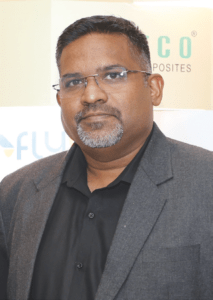
Since 2009, Wooden Homes India has focused on green building, using certified renewable wood and pre-fabricated methods. These structures sequester over 5.7 tonnes of CO₂ per ton of wood, use natural insulation to reduce energy consumption, and generate far less construction waste than conventional materials.
All timber is responsibly sourced from regulated forests, with tree replanting initiatives in place. Caesar’s designs are climate-responsive, prioritizing thermal and acoustic comfort while lowering environmental impact throughout the home’s lifecycle.
Using tongue-and-groove technology and modular prefabrication, the homes can be quickly assembled, dismantled, relocated, and reused – especially valuable in CRZ-regulated coastal zones. Caesar employs kiln-dried, pest-treated red pine, which ensures structural durability, resistance to decay, and minimal use of harmful chemicals.
The homes also enhance occupant wellness by controlling humidity and reducing mold risks – merging sustainability with better living standards.
Caesar has built a vertically integrated business – from timber sourcing to design, fabrication, and on-site assembly. His approach prioritizes quality, sustainability, and customer satisfaction over financial pressures, reinforcing long-term impact over short-term gains.
Caesar’s ethos extends to supporting traditional Goan craftsmanship and aligning with state-led heritage policies. Wooden Homes India promotes fair employment, design innovation, and cultural preservation – serving both people and place.
Under Caesar Fernandes, Wooden Homes India merges sustainable design with social value – setting a new benchmark in responsible construction.
• Eco Materials: Certified wood, carbon-sequestering structures
• Energy Efficiency: Prefab builds, natural insulation, minimal waste
• Circular Design: Modular, relocatable structures
• Financial Independence: Owned facilities, no external debt
• Social Responsibility: Supports local artisans, heritage-aligned projects
What often sets successful entrepreneurs apart is their ability to stay motivated through crisis, adapt to change, and transform challenges into opportunities.
Their stories reveal how resilience, clarity of purpose, and bold thinking fuel growth and disruption in a rapidly changing world. Entrepreneur Speak explores these journeys; what it takes to create, survive, and thrive in an era defined by uncertainty.
My long term vision while building my business was to be part of the reason why people fall in love with Goa − by creating tourism experiences that immerse, educate, and connect visitors from across the world with the essence of Goa.
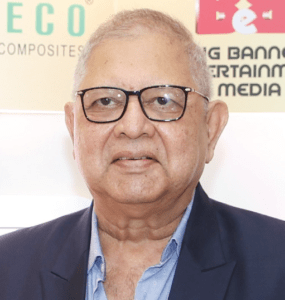
In a volatile, uncertain, complex, and ambiguous (VUCA) world, we look at taking the business towards another long-lasting tenure, by reinventing. Purple patches in business rarely last outside of monopolies. Longevity comes from the ability to reinvent − to anticipate and to respond to changing demands and expectations with agility. Building a moat, whether through cash reserves, brand, partnerships, or intellectual property, helps weather periods of uncertainty. In a mature industry like tourism, a conservative approach allows one to absorb shocks and capitalise on emerging opportunities − often exiting crises stronger than before. Every threat contains the seed of opportunity, our goal has been to anticipate and find it.
Every business has a deciding moment when it could go under or rise like a phoenix. In a business that has lasted over 35 years, such moments have come more frequently than one might imagine. The lifeblood of any enterprise − large or small − is cash flow. No strategy, however visionary, can succeed if cash flow is not accounted for. Business is a relentless process of adaptation, of continually recalibrating in response to new realities, opportunities and constraints.
Keeping myself motivated in times of crisis or challenge is to have a long term perspective. When you set your sights on a 30-year horizon, short-term setbacks don’t seem as daunting. What matters is the ability to reassess, adjust course, and stay aligned with the broader vision. That mindset − of long-term play with short-term adaptability − is what keeps me motivated and focused on the bigger picture”
Our long term vision emanated from our core competence centered around biotechnology and biotech based products that would cater to the requirements of local disease patterns primarily, import substitute and lastly to build products that help potential global usage especially in emerging markets.
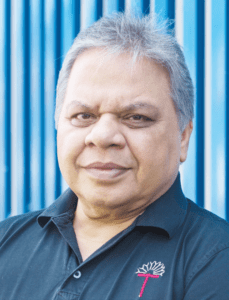
The VUCA world is by and large the only constant! In any business environment, leadership must have clarity and should be able to differentiate between the company requirements that are short term (tactical) and long term (strategic). Businesses must be able to anticipate the direction when the products and technologies would move, so as to address them through adequately funded R&D programs that will churn out futuristic products at the desired frequency. The long term product developmental tunnel has to be juggled with short term tactical moves that keep the company on track irrespective of disruption and changes.
In the initial phase of the company when revenue generation is weak and carrying cost of the business are relatively high, every business faces such moments. The capital inadequacy in the initial phases is a challenge that creates a spectre of the business going under and it is at such moments, leadership resilience and self-belief and resourcefulness are the key variables that help mitigate these challenging moments. As the revenues increase due to the impact of new product development and their acceptability in the market, the company rises to live another day. In the 35 years of our company such moments have come and gone but more or less now a distant memory.
Self-belief, belief in one’s vision, a strong value system and ability to keep the team together moving in a desired direction are the tools to keep one motivated to play the big game continuously.
• A clear purpose: We began with a simple yet powerful idea − to craft desserts that bring people joy, comfort, and celebration.
• Team culture: We work together as a team, many of whom have been with us for years, growing into meaningful roles.
• Customer obsession: We built a system to listen − every piece of feedback, good or bad, is our blueprint for improvement.
• Consistency + Creativity: While our signature cakes and pastries maintain timeless appeal, we constantly experiment with new formats − fusion desserts, healthier options, festival specials.
• Sustainable growth: We never scaled faster than we could handle. Even our expansion − new outlets, central kitchen, online delivery − was done with a long-term view.
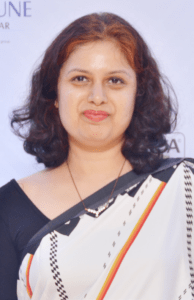
The long-term vision for Desserts N More has always been to build a brand that people emotionally connect with − a household name where people think of us not just for taste, but for trust at pocket-friendly prices.
When we started, I had not planned the blueprint. But along the way, guided by mentors, I created a vision document that has today translated into a chain with eight self-operated shops, four franchisees, and five express counters, numerous supermarkets, and growing. In this decade-long journey, some things have worked, while some haven’t, as we set out to create our footprint across Goa.
My dream has always been to craft world-class bakery products without compromising on the quality while adapting to local tastes. And in every market, we enter − whether it’s a new city or a new platform − our core values of freshness, taste, and hygiene remain non-negotiable.
In the fast-changing world of F&B, sustaining is the biggest risk. We approach this environment with three core strategies:
• Rapid learning and pivoting: For example, during COVID, we quickly introduced contactless home delivery, and online ordering − those kept the brand alive in people’s homes even when our doors were shut.
• Data and customer insight: We now use analytics and AI to track demand patterns, reduce wastage, and personalise offerings − something we never imagined doing when we started.
• Innovation without losing identity: Whether millet-based dessert or a Bento cake, we keep trying and testing every new concept rigorously but stay rooted in what makes us, us − quality, presentation, and taste. We continually reinvent ourselves to avoid monotony, and we have pivoted to manufacturing and retailing healthier products made from whole wheat and multigrain.
The defining moment came during the 2020 lockdown, which caused extensive disruption. In one day, the outlets were shut, while fixed costs like rent and salaries didn’t pause. We had to make a hard call: do we downsize and wait it out, or reinvent ourselves overnight? I remember sitting with my team on late-night WhatsApp calls, brainstorming product ideas. Within a week, we obtained permission from the authorities for essential home delivery, including bread and cookies. We trained our staff in packaging, hygiene, and even customer engagement on digital platforms. Today, it opened a whole new revenue stream with our online orders, as well as onboarding to food delivery platforms like Swiggy/Zomato, which contribute significantly to the business.
On days when the stress is overwhelming, I remind myself of the joy on a child’s face cutting our birthday cake, or the gratitude of a family celebrating a small milestone with our treats.
I also believe in staying connected to my team and my customers, even when I am travelling and in different time zones. Walking into the production kitchen, talking to the counter staff for feedback, reading customer reviews − all of it recharges me more than any business book can.
I surround myself with mentors, peers, and people who challenge me. I keep learning and unlearning through social media, books, and even competitor analysis. And I allow myself time for quiet reflection, which is as important as action.
What truly keeps me going is the invincible support of my husband, family, friends, our employees, and customers, along with the big-picture belief that Desserts N More is not just a bakery, but a brand that people recall and trust. And amidst intense competition from desi and international brands, it’s satisfying that we managed to carve out a space for ourselves amongst all; and keep growing year on year.
The long term vision of building a brand is that withstands the test of time and has a loyal customer base.
I think the world is evolving at a very fast pace. With the speed at which technology is changing, one cannot help but adapt to the changing times or one will be lost. The ethos of the business − the values need to be the same. That would help one to have a long tenure in one’s business.
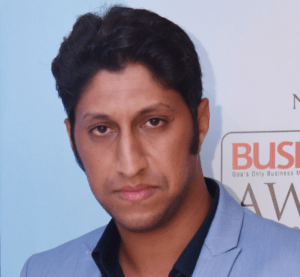
I think the day we decided to diversify into different businesses starting with hospitality − was the deciding moment what this company would achieve and stand for. Today we are part of real estate, hospitality, manufacturing, alcobev and health care sector.
I think I have always followed a 5 year plan. We work hard as team to achieve the goal. This strategy keeps us motivated to achieve the goal; and then we set the next 5 year plan.
However, prior to embarking on this journey, it is imperative for the company, at its inception, to execute several foundational tasks with proficiency. First and foremost, it is vital to establish meticulous accounting practices; this includes eschewing off-the-books transactions and avoiding activities that create vulnerabilities, such as engaging in sales without invoices or inflating asset valuations to secure larger subsidies.
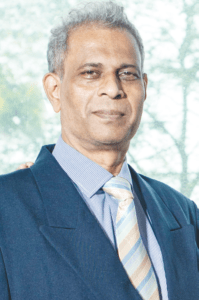
Moreover, it is crucial that the commitments made by the company are honoured. A company should never compromise the integrity of customer relationships. I would assert that it is of utmost importance for a company to uphold its promises; if quality is a commitment, the organisation should not acquiesce to producing substandard products simply because a customer wishes to pay less, even if this is done with the customer’s consent. Ultimately, it is the brand that will bear the responsibility, and no one will recognise that the customer requested inferior quality.
SHAKTI is 29 years young, I believe that when one starts there has to be a vision as to where and what direction the company is going to take.
In our case, while we started with water tanks, our aim was to break into the custom moulded technical parts space. One could opt for toys, but that was not where we wished to go; it would need a huge marketing setup. The other aspect was that we would build our brand on quality and being superior by design.
Today, while we are renowned for being a reputable supplier of high-quality domestic water tanks, 80% of our output is dedicated to sophisticated custom moulding solutions.
The VUCA World is an undeniable reality; there is little one can do but confront each challenge as it arises. The COVID-19 pandemic serves as a pertinent illustration. It was an unforeseen event that caught many off guard. Numerous businesses were completely obliterated, while others flourished. Some managed to navigate the tumult and resumed operations from where they had halted. However, possessing a solid reputation is invaluable, both with customers and financial institutions. We often underestimate the significance of banks in a company’s prosperity.
A Pivotal Moment: In 2000, I attended a rotomoulding conference in the USA. Upon my return a month later, I discovered that sales had plummeted. After conducting a thorough investigation, we found that our primary competitor had slashed their prices by 30% and had also correspondingly reduced the weights of their products. We faced a pivotal decision: should we follow suit and diminish our product’s weight, or should we uphold our commitment to quality by maintaining our current specifications? Ultimately, we resolved to preserve our product’s weight, as it was both justified and essential. Furthermore, we chose to prominently advertise this distinction. Consequently, we concluded that year with a 5% decline in sales; however, we have since experienced consistent year-on-year growth. The moral of the story is that quality ultimately prevails in the long run.
Motivation has to be intrinsic: One must possess intrinsic motivation and establish a clear vision for the direction in which the company is headed. The CEO should articulate his concept with utmost clarity and harbour unwavering confidence in it; no one else can embody the conviction he holds, which is paramount. In this manner, every crisis or challenge will be addressed while keeping the overarching goal and belief in mind. The motivation, being intrinsic, will remain unaffected by external circumstances.
• Clarity − about why you exist beyond profit. At VLW Global, our ‘why’ was always clear: weddings are not events, they’re living memories. We go beyond designing and planning, to protect those precious memories for every family.
• Consistency − in the work, the culture, the quality. It’s not glamorous to repeat what works, but that’s what builds trust year after year.
• Care − for your people. I truly believe no brand outlasts its people. If you look after the team, they will look after the dream.
I never wanted to build a ‘big company.’ I wanted to build a trusted name. Something that feels personal no matter how many weddings we do.
The long-term vision was always to design weddings that feel intentional − not just extravagant for the sake of it − and to set a benchmark for how the Indian wedding industry can respect craft, community, and cultural roots, even as it scales globally.
I knew that if we got that part right, growth would follow − and it has.
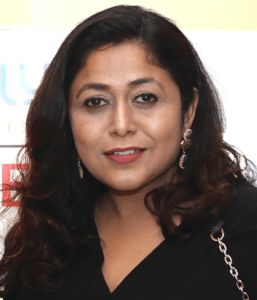
The only way through volatility is agility. We keep our ears close to the ground − what couples want, how families are changing, what new destinations are opening up. We invest in relationships, not just vendor lists. If tomorrow sustainability or digital-first experiences become non-negotiable, we adapt without losing our soul. That’s the balance − innovate without forgetting who you are. A wedding business can’t stand still; But the values underneath have to stay rock solid.
2020 brought our entire industry to its knees overnight. Weddings were cancelled, postponed, redesigned for guest lists of ten people instead of 500.
We could have shut shop, waited it out. But instead, we decided to serve harder. We turned planners into crisis
COVER STORY
managers. We figured out intimate celebrations, new safety rituals, how to keep families reassured in uncertain times.
That period changed us. It made us resilient, creative, and oddly − more trusted than ever before.
Weddings have taught me − nothing is ever fully in your control. Baraats run late, rain comes uninvited; the unexpected is always around the corner.
So I try not to chase perfection in a crisis. I focus on what can be done with calm, kindness and courage.
And I remind myself: this work is bigger than a season or setback. It’s about people, stories, and families. That’s my fuel on the hardest days − knowing that what we create will live on in someone’s memory, long after the crisis has passed.





